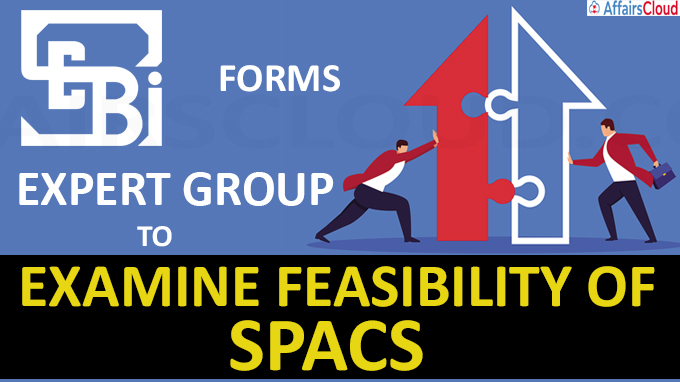 On March 11, 2021, Securities and Exchange Board of India (SEBI) had formed the Group of Experts under its Primary Market Advisory Committee (PMAC) to check the feasibility to implement Special Purpose Acquisition Companies (SPACs) like structures in India.
On March 11, 2021, Securities and Exchange Board of India (SEBI) had formed the Group of Experts under its Primary Market Advisory Committee (PMAC) to check the feasibility to implement Special Purpose Acquisition Companies (SPACs) like structures in India.
Objective – It raises money from investors with the aim of acquiring private businesses by merging them. Essentially, a SPACs takes companies or start-ups public through the back door route.
What is SPACs?
SPACs are blank-cheque companies, which have no operations or business plans when they seek investor money.
Eligibility to become SPACs:
- Private equity funds or Financial Institutions(FIs), who is expertise in a particular industry or business sector, with investment for initial working capital and issue related expenses can form SPACs.
Why there is Need of SPACs?
- The Tradition way of raising money via Initial Public Offering (IPO) is Tedious, Because there are so many process involved in it like, preparing for more disclosures, hiring investment bankers, getting the pricing right.
- The Second thing is time. The Time taken to complete the process ranges from 18 to 24 months.
Advantage of Special Purpose Acquisition Companies (SPACs):
i.SPACs consumes less time than IPO for an organization to acquire the target company.
ii.Similar to private equity type transactions, If the buyer is a public Share holder, then the SPACs give the advantage of investing along with the sponsors in the SPAC.
iii.The Advantage of Target company is that, while it is being acquired by the SPAC, it will be available to public during periods of market instability or volatility in traditional IPO markets.
Limitations of SPACs:
i.IPO follows same trading cycles, where as SPACs follow distinct Trading Cycles which increases the uncertainty risk like divergent interests of sponsors, investors and the target company.
ii.One of the advantage of SPACs is its minimal time consumption but due to the challenges like scheme of arrangement makes SPACs time consuming.
iii.As per the Companies Act, 2013, a company is required to commence business within one year of incorporation. This may not suit a SPAC which may not have business for nearly two years.
Recent Related News:
i.In order to strengthen the risk management framework, SEBI will introduce pre-expiry margins on cash settled contracts with effect from April 1, 2021. Under this underlying commodities are deemed to be susceptible to possible near zero or negative prices.These margins will be levied during the last five trading days prior to expiry date, wherein they will increase by 5% every day.These will be applicable on certain commodities under the Alternate Risk Management Framework (ARMF).
About Securities and Exchange Board of India (SEBI):
Chairman – Shri Ajay Tyagi
Headquarter – Mumbai, Maharashtra




